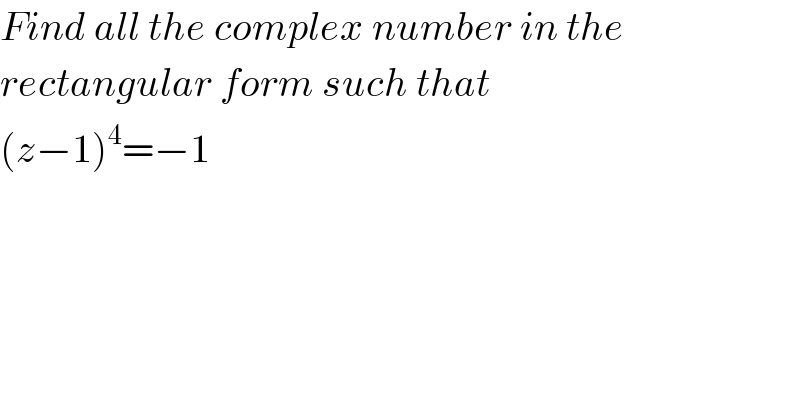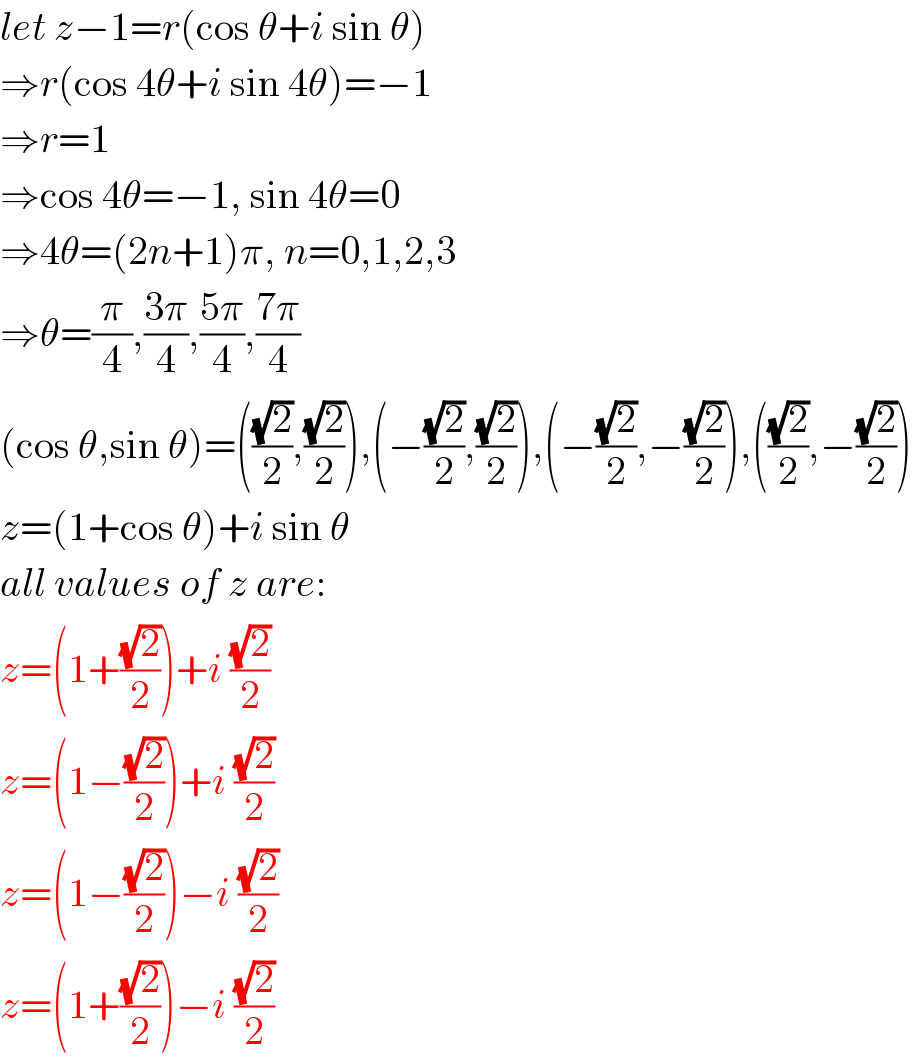
Question Number 38284 by NECx last updated on 23/Jun/18

$${Find}\:{all}\:{the}\:{complex}\:{number}\:{in}\:{the} \\ $$$${rectangular}\:{form}\:{such}\:{that} \\ $$$$\left({z}−\mathrm{1}\right)^{\mathrm{4}} =−\mathrm{1} \\ $$$$ \\ $$
Commented by MrW3 last updated on 23/Jun/18

$${let}\:{z}−\mathrm{1}={r}\left(\mathrm{cos}\:\theta+{i}\:\mathrm{sin}\:\theta\right) \\ $$$$\Rightarrow{r}\left(\mathrm{cos}\:\mathrm{4}\theta+{i}\:\mathrm{sin}\:\mathrm{4}\theta\right)=−\mathrm{1} \\ $$$$\Rightarrow{r}=\mathrm{1} \\ $$$$\Rightarrow\mathrm{cos}\:\mathrm{4}\theta=−\mathrm{1},\:\mathrm{sin}\:\mathrm{4}\theta=\mathrm{0} \\ $$$$\Rightarrow\mathrm{4}\theta=\left(\mathrm{2}{n}+\mathrm{1}\right)\pi,\:{n}=\mathrm{0},\mathrm{1},\mathrm{2},\mathrm{3} \\ $$$$\Rightarrow\theta=\frac{\pi}{\mathrm{4}},\frac{\mathrm{3}\pi}{\mathrm{4}},\frac{\mathrm{5}\pi}{\mathrm{4}},\frac{\mathrm{7}\pi}{\mathrm{4}} \\ $$$$\left(\mathrm{cos}\:\theta,\mathrm{sin}\:\theta\right)=\left(\frac{\sqrt{\mathrm{2}}}{\mathrm{2}},\frac{\sqrt{\mathrm{2}}}{\mathrm{2}}\right),\left(−\frac{\sqrt{\mathrm{2}}}{\mathrm{2}},\frac{\sqrt{\mathrm{2}}}{\mathrm{2}}\right),\left(−\frac{\sqrt{\mathrm{2}}}{\mathrm{2}},−\frac{\sqrt{\mathrm{2}}}{\mathrm{2}}\right),\left(\frac{\sqrt{\mathrm{2}}}{\mathrm{2}},−\frac{\sqrt{\mathrm{2}}}{\mathrm{2}}\right) \\ $$$${z}=\left(\mathrm{1}+\mathrm{cos}\:\theta\right)+{i}\:\mathrm{sin}\:\theta \\ $$$${all}\:{values}\:{of}\:{z}\:{are}: \\ $$$${z}=\left(\mathrm{1}+\frac{\sqrt{\mathrm{2}}}{\mathrm{2}}\right)+{i}\:\frac{\sqrt{\mathrm{2}}}{\mathrm{2}} \\ $$$${z}=\left(\mathrm{1}−\frac{\sqrt{\mathrm{2}}}{\mathrm{2}}\right)+{i}\:\frac{\sqrt{\mathrm{2}}}{\mathrm{2}} \\ $$$${z}=\left(\mathrm{1}−\frac{\sqrt{\mathrm{2}}}{\mathrm{2}}\right)−{i}\:\frac{\sqrt{\mathrm{2}}}{\mathrm{2}} \\ $$$${z}=\left(\mathrm{1}+\frac{\sqrt{\mathrm{2}}}{\mathrm{2}}\right)−{i}\:\frac{\sqrt{\mathrm{2}}}{\mathrm{2}} \\ $$
Commented by abdo.msup.com last updated on 23/Jun/18
![let put z−1=x (e)⇔x^4 =e^(iπ) if x=r e^(iθ) we get r^4 e^(i4θ) =e^(i(2k+1)π) ⇒r=1 and 4θ=(2k+1)π ⇒θ_k =(((2k+1)π)/4) with k∈[[0,3]] and x_k =e^(i(((2k+1)π)/4)) ⇒z_k =x_k +1= 1+e^(i(((2k+1)π)/4)) ⇒ z_0 =1+e^(i(π/4)) z_1 =1+e^(i((3π)/4)) z_2 =1+e^(i((5π)/4)) z_3 =1+e^(i((7π)/4))](Q38313.png)
$${let}\:{put}\:{z}−\mathrm{1}={x}\:\:\left({e}\right)\Leftrightarrow{x}^{\mathrm{4}} \:={e}^{{i}\pi} \:\:{if}\:{x}={r}\:{e}^{{i}\theta} \\ $$$${we}\:{get}\:{r}^{\mathrm{4}} \:{e}^{{i}\mathrm{4}\theta} \:={e}^{{i}\left(\mathrm{2}{k}+\mathrm{1}\right)\pi} \:\Rightarrow{r}=\mathrm{1}\:{and} \\ $$$$\mathrm{4}\theta=\left(\mathrm{2}{k}+\mathrm{1}\right)\pi\:\Rightarrow\theta_{{k}} =\frac{\left(\mathrm{2}{k}+\mathrm{1}\right)\pi}{\mathrm{4}} \\ $$$${with}\:{k}\in\left[\left[\mathrm{0},\mathrm{3}\right]\right]\:{and}\:{x}_{{k}} ={e}^{{i}\frac{\left(\mathrm{2}{k}+\mathrm{1}\right)\pi}{\mathrm{4}}} \\ $$$$\Rightarrow{z}_{{k}} ={x}_{{k}} \:+\mathrm{1}=\:\mathrm{1}+{e}^{{i}\frac{\left(\mathrm{2}{k}+\mathrm{1}\right)\pi}{\mathrm{4}}} \:\:\Rightarrow \\ $$$${z}_{\mathrm{0}} =\mathrm{1}+{e}^{{i}\frac{\pi}{\mathrm{4}}} \\ $$$${z}_{\mathrm{1}} =\mathrm{1}+{e}^{{i}\frac{\mathrm{3}\pi}{\mathrm{4}}} \\ $$$${z}_{\mathrm{2}} =\mathrm{1}+{e}^{{i}\frac{\mathrm{5}\pi}{\mathrm{4}}} \\ $$$${z}_{\mathrm{3}} =\mathrm{1}+{e}^{{i}\frac{\mathrm{7}\pi}{\mathrm{4}}} \\ $$
Answered by tanmay.chaudhury50@gmail.com last updated on 23/Jun/18

$${z}−\mathrm{1}=\left(−\mathrm{1}\right)^{\frac{\mathrm{1}}{\mathrm{4}}} \\ $$$${cos}\Pi=−\mathrm{1}\:\:\: \\ $$$${z}−\mathrm{1}=\left\{{cos}\left(\mathrm{2}{n}\Pi+\Pi\right)+{isin}\left(\mathrm{2}{n}\Pi+\Pi\right)\right\}^{\frac{\mathrm{1}}{\mathrm{4}}} \\ $$$${x}+{iy}−\mathrm{1}={cos}\left(\frac{\mathrm{2}{n}+\mathrm{1}}{\mathrm{4}}\right)+{isin}\left(\frac{\mathrm{2}{n}+\mathrm{1}}{\mathrm{4}}\right) \\ $$$$\left({x}−\mathrm{1}\right)^{\mathrm{2}} +{y}^{\mathrm{2}} ={cos}^{\mathrm{2}} \left(\frac{\mathrm{2}{n}+\mathrm{1}}{\mathrm{4}}\right)+{sin}^{\mathrm{2}} \left(\frac{\mathrm{2}{n}+\mathrm{1}}{\mathrm{4}}\right) \\ $$$$\left({x}−\mathrm{1}\right)^{\mathrm{2}} +{y}^{\mathrm{2}} =\mathrm{1} \\ $$
